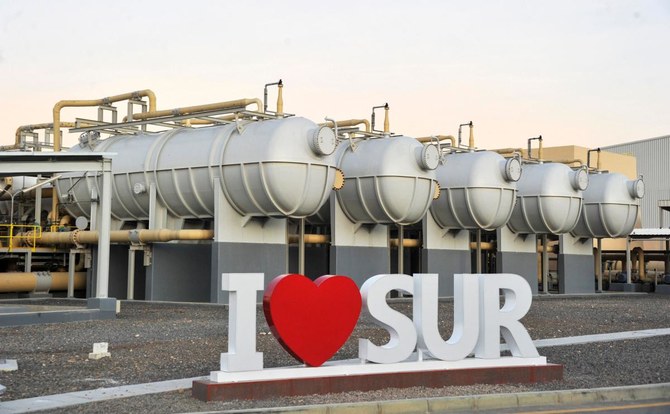SUR, OMAN: “We have water, and it’s the most important thing in a house,” says Abdullah Al-Harthi from the port city of Sur in Oman, a country that relies on desalination plants.
But for Oman and the other Gulf countries dominated by vast and scorching deserts, obtaining fresh water from the sea comes at a high financial and environmental cost.
In Sur, south of the capital Muscat, water for residents and businesses comes from a large desalination plant that serves some 600,000 people.
“Before, life was very difficult. We had wells, and water was delivered by trucks,” the 58-year-old told AFP. “Since the 1990s, water has come through pipes and we’ve had no cuts.”
But these benefits — relying on energy intensive processes that produce carbon emissions — do not come without a cost, particularly as global temperatures rise.
The United Nations says 2019 is on course to be one of the hottest three years on record.
And there is another impact: the desalination plants produce highly concentrated salt water, or brine, that is often dumped back into the ocean.
Researchers say more than 16,000 desalination plants around the globe produce more toxic sludge than freshwater.
For every liter of freshwater extracted from the sea or brackish water, a liter-and-a-half of salty slurry is deposed at sea or on land, according to a 2019 study in the journal Science.
All that extra salt raises the temperature of coastal waters and decreases the level of oxygen, which can conspire to create biological “dead zones.”
The super-salty substance is made even more toxic by the chemicals used in the desalination process.
Oman’s bigger neighbors produce the bulk of the brine.
More than half comes from just four countries — Saudi Arabia, at 22 percent, United Arab Emirates with 20 percent, and smaller shares by Kuwait and Qatar, according to UN data.
“Brine production in Saudi Arabia, UAE, Kuwait and Qatar accounts for 55 percent of the total global share,” according to the United Nations University Institute for Water, Environment and Health.
It said new strategies are needed “to limit the negative environmental impacts and reduce the economic cost of disposal.”
This would help “to safeguard water supplies for current and future generations.”
At the Sur plant, “almost no chemicals” are used during the pre-treatment phase, as the water is naturally filtered through the cracks of karst rocks, said Mahendran Senapathy, operations manager at French company Veolia which runs the plant along with an Omani firm.
There are other ways to safeguard freshwater supplies, from encouraging savings and efficiently to recycling wastewater.
Antoine Frerot, chief executive of Veolia, said wastewater recycling will help resolve the problem of water scarcity.
He also pointed out that “reused water is less costly,” nearly one third less than that won through desalination.
Omani authorities continue to mount campaigns urging people to use water wisely, mindful that other demands — especially the energy sector — also guzzle up large amounts.
Across the Gulf, huge amounts of water are used not just for homes, gardens and golf courses, but also for the energy sector that is the source of the region’s often spectacular wealth.
On the edge of the Arabian peninsula’s “Empty Quarter,” the world’s largest expanse of sand, lies the Khazzan gas field, operated by BP and the Oman Oil Company.
The method used to extract the gas here is hydraulic fracturing — more commonly known as fracking — said Stewart Robertson, operations manager at the site.
The method requires huge amounts of water. The site is supplied by a facility that provides 6,000 cubic meters of water a day, extracted from an underground aquifer 50 kilometers (30 miles) away.
Fracking involves directional drilling and then pumping water, sand and chemicals at high pressure to fracture rock and release the hydrocarbons.
The rock formations that hold the gas are “like a big sponge with lots of little holes in it,” said Robertson, explaining that fracking is the process “to open those holes slightly to take the gas out.”
So the more the region extracts oil and natural or shale gas, “the more they need water,” said Charles Iceland of the World Resources Institute.
“The Middle East is projected to need more and more energy,” he said. “So that means the situation is going to get worse.”
“On the other hand,” he said, “if they can produce power using solar photovoltaic technologies, which are getting reasonably priced in the Middle East, that would take care of a lot of the problem because solar PV doesn’t need much water.
“You need just some water to clean the solar panels.”



























